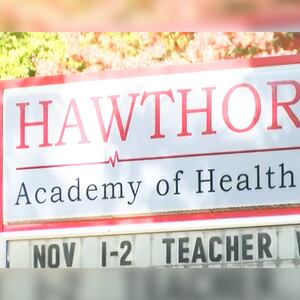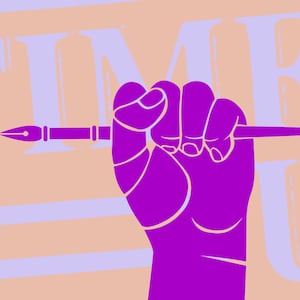When news broke that a 15-year-old student at Hawthorne Academy in North Carolina had been suspended after reporting an alleged sexual assault to her school, the country was shocked. Other students in her school district were not.
For years, students in the Charlotte-Mecklenburg School District have brought forward horrifying allegations of sexual assault—being assaulted in the woods, raped in school bathrooms, groped on school buses—and claimed administrators and resource officers discouraged them from reporting the attacks. They have filed lawsuits, hosted town halls, and initiated federal investigations. Now they are taking to the street.
“[The district is] more focused on their reputation and money and how people perceive them… than they are about the actual students,” said Serena Evans, a former CMS student who claims she was sexually assaulted at school in 2016.
“We’re hoping that this becomes… an actual movement where it goes nationwide, where other schools and other school districts start talking about this stuff and taking it seriously.”
In a statement to The Daily Beast, CMS Superintendent Earnest Winston said the district “takes allegations of misconduct seriously and all school-based staff are required to take annual training on how to report such allegations.” He said the school could not comment on specific allegations involving alleged misconduct, personnel matters, or student discipline.
The Hawthorne Academy student received her suspension last month, after administrators determined she had given false information when reporting an upperclassman who she said followed her into the school bathroom and shoved his hands under her clothes. The police, however, found her statement credible, and pressed charges against the male student for sexual battery. When her mother tried to raise this fact with the school, she told The Daily Beast, they told her there was nothing they could do.
News of the suspension sparked outcry in the community and spurred national headlines. But what outraged readers did not know was that the district had long been accused of covering up sexual assaults—starting in 2015, when a Myers Park High School student reported being raped in the woods near campus. That student’s report led to a federal Department of Education investigation into the district, which found the school had violated her rights by failing to tell her that it had deemed her complaint "mutual sexual contact" and closed the case.
In the years following, that student and one other sued the district, claiming administrators had discouraged them from filing reports in the first place. But the news did not gain traction until this summer, when the second survivor settled her suit with the district and decided to speak out.
That student, now-22-year-old Nikki Wombwell, told The Daily Beast she was frustrated by the legal process, during which she felt the school refused to take accountability. So she took the first settlement they offered her and started sharing her story with the local press.
In interviews, and in her suit against the district, Wombwell claims she was being harassed by an abusive ex-boyfriend during her sophomore year at Myers Park. One day, she says, he threatened to bring a gun to school if she refused to meet him after class. When she agreed, he allegedly led her back to the woods outside of the school and raped her over the sound of her protests. She reported the incident to the school the next day, but says the student remained on campus.
A month and half later, Wombwell says, when the student refused to stop harassing her, she reported him again. This time, she claims a school resource officer told her that there was not enough evidence of duress to support a rape charge. She says she was taken to see then-Principal Mark Bosco, who warned her she could be disciplined if she reported the incident and was found not to have told the truth. (The school has admitted that the resource officer told Wombwell there was not enough information to support a criminal charge, but denied any “actions or statements by Bosco intending to discourage [Wombwell] from taking any action.”)

Nikki Wombwell: a former Myers Park student who sued the school for allegedly mishandling her sexual assault report and settled with them this year.
Photo Illustration by The Daily Beast/Courtesy of Nikki WombwellWombwell decided not to report, and says she spent the next two and a half years avoiding her alleged assailant in the hallways and at after-school events. She cried at graduation when he walked across the stage to get his diploma.
“There was always that fear that he was on campus, and the sadness and anger that nothing was really done,” she said.
News of Wombwell’s story caused an uproar in the local community, who demonstrated outside Myers Park and staged a protest at a board of education meeting. A petition demanding justice for Myers Park survivors garnered nearly 74,000 signatures. At the same time, multiple other students and graduates came forward to say that their sexual assault reports had been mishandled by the school, too.
One of those students was Evans, a former student who claims she was sexually assaulted by a student athlete in the men’s locker room in 2016. Evans and her mother quickly reported the assault to the school and the police department, though charges were never filed. Like Wombwell, Evans says administrators warned her that she could be disciplined if her report was deemed inaccurate, and that it could impact her college admissions chances.
Instead, in emails reviewed by The Daily Beast, Evans and her mother continually asked for the male student to receive counseling and education. The school promised to look into it, but Evans said they never received any kind of confirmation. In one of her final emails to the school, Evans' mother wrote: “I am no longer going to ask you for updates on [the alleged assailant] because, based on the history so far, I no longer believe that you (the school, CMS) are going to give me any info and updates, nor do anything about the situation on Serena’s behalf. I am tired of waiting around for you all to reach back out.”

Serena Evans: a former Myers Park student who says administrators discouraged her from reporting her 2016 assault.
Photo Illustration by The Daily Beast/Courtesy of Serena EvansAnother student who graduated from Myers Park this year told WBTV she had attempted to report a sexual assault by another student in 2018, and even filed a police report, but was told by an assistant principal that pressing charges against the student would ruin his reputation. Another student told WFAE that she was assaulted in the woods outside the school, but did not report because of an assembly in which Bosco told female students that the school could not protect them if they went into the woods with boys.
Wombwell said the latest case out of Hawthorne Academy was the hardest for her to hear, since she had chosen not to report her own assault after being threatened with suspension. “It definitely made me think, ‘Wow, if I had gone through with the school investigation, would that have happened to me?’” Wombwell said.
The uproar over the students’ allegations this summer led to multiple changes in the district, including the formation of a Title IX Task Force and anti-harassment training for all employees. The task force is expected to issue recommendations on preventing and responding to sexual assault to the superintendent in the coming weeks. Bosco, the Myers Park principal, was moved to another position in the district following an internal investigation. (His lawyers have claimed the district found no wrongdoing on his part; Wombwell said neither she nor her mother were ever interviewed as part of the investigation.)

Myers Park High School bathroom in 2016
Photo Illustration by The Daily Beast/Courtesy of Maggie Rothenberg“Trust is among the most important factors we must develop and maintain as we serve our students, families, staff and the community,” Winston wrote in a letter announcing the creation of the task force. “I am committed to doing everything possible to make Charlotte-Mecklenburg Schools more responsive and to build that trust.”
But in mid-October, another high school in the district allowed a football player who had been charged with sexual assault to take the field in an ankle monitor, just one week after another sexual assault was reported on campus. Hundreds of students walked out of class in protest. In response, Olympic High School Principal Casey Jones sent an email to students claiming the walkouts had “impacted our entire school day” and that anyone who walked out could be disciplined under the district’s code of conduct, according to the Charlotte Observer. Several volleyball players claimed they were benched for participating. (The school later announced that any student athlete charged for a criminal offense would not be allowed to participate in athletics while the charges were pending.)
Two weeks later, the 15-year-old Hawthorne Academy student was suspended, bringing the issues in the district to national attention. The school principal and assistant principal have since been suspended with pay, and the district Title IX office has reopened the student’s case. Her suspension has also been placed on hold, but she told The Daily Beast she was barred from participating in ROTC after-school activities because her alleged assailant also belonged. She is also being required to take a weekend course entitled “Sexual Harassment is Preventable.”
“Schools teach your kids, ‘You see something, you say something, if you feel threatened, you say something,’” the student’s mother previously told The Daily Beast. “And in this case my daughter did, and it seems that the school system has failed her.”
Former students say they have little faith that the district will make meaningful change on its own. The Title IX task force meetings are held in private; the district has refused to release the names of most members. A current student attempted to set up a meeting with board members in July, but the school board abruptly canceled it after survivors requested to attend, claiming they could not meet with anyone who had “potential or past claims against the district.”
Instead, current and former students are hoping to force a reckoning through protest and media coverage. Activists are currently planning a protest for survivors on Nov. 20 at a local park, hoping to raise the national profile of their fight.
Both Evans and Wombwell said they wanted to create change in their school district, but also wanted to raise broader awareness about the fact that sexual assaults occur in K-12 schools, too.
“There’s been quite a few national convos around assault on college campuses, but I don't think most people even realize that these things happen on high-school campuses and middle-school campuses,” Wombwell said.
“It’s happening to children, and they don’t know their rights, and they shouldn’t have to,” she added. “They shouldn’t have to be the ones advocating for themselves. The schools should be advocating for them.”








